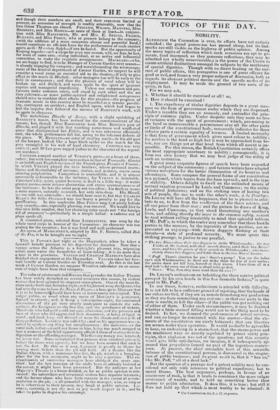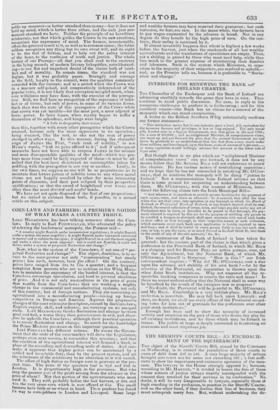TOPICS OF THE DAY.
NOBILITY.
ALTHOUGH the Coronation is over, its effects have not entirely subsided ; the grand procession has passed along, but its foot- marks are still visible on the highway of public opinion. Among the many topics of reflection which such occasions are apt to ge- nerate, (and inasmuch as they generate reflections, they may be admitted not wholly unserviceable,) is the power of the Crown to create artificial distinctions amongst its subjects by the machinery of special dignities. Though with no direct bearing on the cur- rent of public affairs, this prerogative is one of great efficacy for good or evil, and forms a very proper subject of discussion, both as regards its abstract political merits and the specific modes of its employment. It. may be made the ground of two sorts of in- quiry, in fact.
For we may ask, I. Whether it should be exercised at all? or, 2. How it should be exercised ?
I. The expediency of titular dignities depends in a great mea- sure on the form of government under which they are dispensed. Under a republic they are an anomaly, and contradict the prin- ciple of common rights. Under despotic rule they seem no less at variance with the spirit of government ; which, presuming in the head so immensurable a preeminence over all the other parts or limbs of the constitutional body, necessarily indicates for those inferior parts a certain equality of lowness. A limited monarchy is that form of government which gives most colour to nobility ; for neither is the head so high but it may be approached from be- low, nor are things yet at that level from which all ascent is im- possible. For this reason, the British Constitution certainly offers the most appropriate sanctuary to nobility ; consequently, it is from our own history that we may best judge of the utility of such an institution.
A great many exquisite figures of speech have been expended on the subject of the aristocracy ; and various writers have adopted various metaphors for the better illumination of its beauties and advantages. Sonic compare the general frame of our constitution to a pyramid, which tapers from the base upwards, and is the type of stability. Others delight to dwell on the unlimited means of mutual vexation possessed by Lords and Commons; on the utility of political jealousies; and on the striking uses of having two
sets of people, the one to undo the other's work, ei la Penelope. DE LOLME will have all the happiness, that he is pleased to attri-
bute to us, to flow from the confliction of the three estates. and
all our peace from their war ; and the picture lie draws of King, Lords, and Commons, as they stand threatening one another's lives, and adding thereby the more to the common safety, cannot
be read without calling irresistibly to mind that splendid tableau of Mr. Puff's, in which the reader may remember that three hostile parties in like manner, by the ingenuity of their position, arc re- presented as enjoying—with drawn daggers flashing at their throats—a state of profound security. We must quote this striking passage, in justice to our parallel.
" The two Nieces draw their two daggers to strike Whisktrandos ; the two Uncles at Mc instant, with their swords drawn, catch their two Nieces' arms, and tarn the points of their swords to Whisherandos ; who imme- diately draws two daggers, and holds them to the two Nieces' bosoms.
"Pull. There's situation for you! there's a poop! You see the ladies can't stab Whiskerandos; he durst not strike them for fear of their uncles ; the uncles durst not kill Min, beeaule of their nieces. 1 have them all at a dead lock !—for every one of them is afraid to let go first. " Snap. Why, then they must stand there for ever !"
De LOLME'S enthusiasm on beholding the three estates political grouped by his own hands in this fine dramatic faahion,* is quite equal to Mr. Pun.
In our times, however, enthusiasm is attended with difficulty. It is not felt to be a sufficient ground of rejoicing, that the hands of our rulers are tied, if they are as remote from doing any good action as they are from committing any evil one ; or that one party in the state is unable, to kill the other—if the public can get nothing out of either of them. Under such circumstances, it may be doubted whether a little mutual killing would not be the thing most to be desired. In fact, we demand the performance of actual services,
and can no longer be contented with the answer—that the ele- ments of the constitution are nicely balanced ; that our liberties are secure under their operation. It would no doubt be agreeable to hear, on embarking in a steam-boat, that the steam-power and the machinery were so exactly regulated by patent safety prin- ciples, that explosion was out of the question; yet this security
would give little satisfaction, we imagine, if it subsequently ap- peared that propulsion formed no part of the ingenious contriv-
ance. At present, the chief ostensible fruit of this scientific balance of the constitutional powers, is discovered in the stagna- tion of public business ; and its great merit is, that it " has us," like Mr. Puff, " all at a dead lock."
But the question of a peerage and a patent nobility may be con- sidered not only with reference to political expedience, but to moral fitness. The best argument, perhaps, in favour of an aristocracy of rank, is that it tends to counteract the more vulgar aristocracy of wealth, and to hold up something better than money to public admiration. It does this, it is true ; but still it dues nut hold up that which is most worthy to be admired: it
• The collimate:a), lib, S. c. 17. et pssitn. Hold; up manners—a better standard than money—but it does not hold up mind, which is better than either, and the only just per- manent standard we have. Neither the principle of an hereditary aristocracy, nor that which guides the Crown in its new creations, recognizes the supremacy of mind. The former, incontestably, offers the grossest insult to it, as well as to common sense ; the latter seldom recognizes any thing but its own sweet will, and its right to be the tool of faction, and to help out the paltry interest of the hour, to the confusion of truth and justice. The whole history of our Peerage—all that you shall read to the contrary in the lying records of modern literary lickspittles, notwithstand- ing—is one flat and impudent denial of the claims both of intel- lect and of morality. In remote times, the standard was not higher, but it was probably purer. Strength and courage in the field, loyalty in the council, were the qualities commonly rewarded with the coronet; and at a period when the Crown was in a manner sellpoised, and comparatively independent of the popular voice, it is not likely that corruption mingled much, what- ever wilfulness may have done, with the exercise of the preroga- tive. Still, we find here no recognition of the supremacy of intel- lect or of virtue, but only of power, in some of its various forms. Such then was the state of this prerogative of the Crown while that crown was yet terrible—for the most part, a mere adjunct of brute power. In later times, when royalty began to suffer a diminution of its splendour, and kings were taught
" A little to disquantity their trains,"
then this, together with every other prerogative which the Crown retained, became only the more oppressive in its operation ; being strained, like the rest, to eke out the sum of power abridged in other ways. In this manner, during the shameful reign of JAMES the First, "each rank of nobility," to use HUME'S words, " had its price affixed to it;' and if subsequent monarchs have not been able to surpass Jattss in the meaner and more disrespectable qualities of the mind—which was per- haps more than could be fairly expected of them—it must be ad- mitted that the best have discovered no contemptible talent for peddling with the prerogative in one way or another. Lastly, in our own times, we suppose no one will be so preposterous as to maintain that letters patent of nobility issue to any whose moral claims are not happily overlaid by other far more interesting points of character, and their past eclipsed by their prospective qualifications; or that the sword of knighthood ever waves over other than the most devoted and useful heads.
We have yet not quite disposed of the first of our propositions ; but we intend to exhaust them both, if possible, in a second article on this subject.



























 Previous page
Previous page